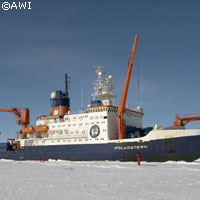Research ship heads to Arctic to study biodiversity hotspots
The research ship Polarstern is getting ready to leave its home harbour of Bremerhaven, Germany, for the chillier waters of the Arctic. On its 22nd Arctic expedition, the ship, which belongs to the Alfred Wegener Institute for Polar and Marine Research, will be used by researchers working on the EU-funded HERMES (Hotspot Ecosystems Research on the Margins of European Seas) project. The goal of HERMES is to study Europe's deep marine ecosystems, including biodiversity hotspots such as cold seeps, cold-water coral mounds and reefs, canyons and communities found on open slopes. First stop for the Polarstern on this trip will be the cold water corals in the deep, nutrient-rich waters off the coast of Norway. Although they are less well known than their tropical counterparts, these cold water reefs are just as high in diversity, and offer a home to a startling array of marine life. In the expedition, the manned underwater craft JAGO will be sent down to depths of up to 400 metres to examine and photograph this valuable ecosystem. In the second stage of the expedition, the Polarstern will head for the Håkon-Mosby mud volcano. At this cold seep, methane gas bubbles up from the sea floor at a depth of 1,250 metres. These systems sustain large numbers of animals, many of which are unique to one site. There is still much to learn about the geological, chemical and biological processes taking place at these seeps, and on this latest expedition, scientists will use a remote-controlled vessel called QUEST to aid them in their investigations. The third part of the expedition concerns the 'Hausgarten', a deep sea observatory which is run by the EU-funded ESONET (European Seas Observatory Network) project. Here, QUEST will be used again to study natural conditions in the deep sea. Finally, Polarstern will head into the eastern Arctic, where, in conjunction with other research ships, she will evaluate the condition of the Arctic Ocean in relation to climate change. This work will form an important contribution to the International Polar Year, which got underway earlier this year. Earlier this month, Polarstern returned to Bremerhaven after 19 months in the Antarctic.

